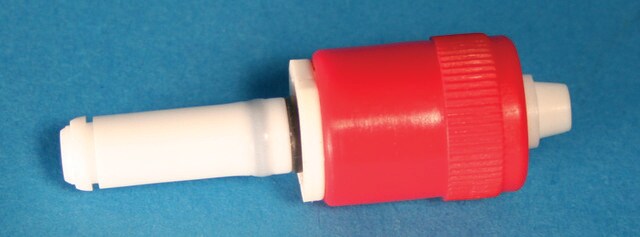Wszystkie zdjęcia(2)
Key Documents
860462P
Avanti
N-C16-deoxysphinganine
N-palmitoyl-1-deoxysphinganine (m18:0/16:0), powder
Synonim(y):
N-hexadecanoyl-1-deoxysphinganine (m18:0/16:0); N-C16-1-deoxyDHCer; 110960
Zaloguj sięWyświetlanie cen organizacyjnych i kontraktowych
About This Item
Wzór empiryczny (zapis Hilla):
C34H69NO2
Numer CAS:
Masa cząsteczkowa:
523.92
Kod UNSPSC:
12352211
NACRES:
NA.25
Polecane produkty
Próba
>99% (TLC)
Postać
powder
opakowanie
pkg of 1 × 1 mg (860462P-1mg)
pkg of 1 × 5 mg (860462P-5mg)
producent / nazwa handlowa
Avanti Research™ - A Croda Brand 860462P
typ lipidu
sphingolipids
bioactive lipids
Warunki transportu
dry ice
temp. przechowywania
−20°C
Opis ogólny
Commonly referred to as 1-deoxydihydroceramide (1-deoxyDHCer), this product is the N-acylated form of 1-deoxysphinganine, a potent inhibitor of sphingolipid metabolism. The biological activity of 1-deoxyDHCer is not clearly understood at this time.
N-C16-deoxysphinganine Commonly referred to as 1-deoxydihydroceramide (1-deoxyDHCer), is the N-acylated form of 1-deoxysphinganine, a potent inhibitor of sphingolipid metabolism. The N-acyl group can be 16, 20 and 24 carbon chain. N-acylsphinganines (dihydroceramides) are synthesized by the acylation of sphingoid bases in the presence of ceramide synthases (CerS).
Działania biochem./fizjol.
N-acylsphinganines (dihydroceramides) levels are lower during ceramide synthase inhibition. They are intermediates of ceramide and dihydrosphingolipids synthesis. Treatment of MCF7 cancer cells with fenretinide alters sphingolipid metabolism.
Opakowanie
5 mL Amber Glass Screw Cap Vial (860462P-1mg)
5 mL Amber Glass Screw Cap Vial (860462P-5mg)
Informacje prawne
Avanti Research is a trademark of Avanti Polar Lipids, LLC
This page may contain text that has been machine translated.
Kod klasy składowania
11 - Combustible Solids
Klasa zagrożenia wodnego (WGK)
WGK 3
Certyfikaty analizy (CoA)
Poszukaj Certyfikaty analizy (CoA), wpisując numer partii/serii produktów. Numery serii i partii można znaleźć na etykiecie produktu po słowach „seria” lub „partia”.
Masz już ten produkt?
Dokumenty związane z niedawno zakupionymi produktami zostały zamieszczone w Bibliotece dokumentów.
Sphingolipidomics: a valuable tool for understanding the roles of sphingolipids in biology and disease
Merrill AH, et al.
Journal of Lipid Research, 50, S97-S102 (2009)
Ceramide synthase inhibition by fumonisin B1 causes accumulation of 1-deoxysphinganine a novel category of bioactive 1-deoxysphingoid bases and 1-deoxydihydroceramides biosynthesized by mammalian cell lines and animals
Zitomer NC, et al.
The Journal of Biological Chemistry, 284(8), 4786-4795 (2009)
Thematic Review Series: Sphingolipids. Biodiversity of sphingoid bases (?sphingosines?) and related amino alcohols
Pruett ST, et al.
Journal of Lipid Research, 49(8), 1621-1639 (2008)
Noemi Jiménez-Rojo et al.
Biophysical journal, 107(12), 2850-2859 (2014-12-18)
Ceramides and dihydroceramides are N-acyl derivatives of sphingosine and sphinganine, respectively, which are the major sphingoid-base backbones of mammals. Recent studies have found that mammals, like certain other organisms, also produce 1-deoxy-(dihydro)ceramides (1-deoxyDHCers) that contain sphingoid bases lacking the 1-hydroxyl-
Sarah T Pruett et al.
Journal of lipid research, 49(8), 1621-1639 (2008-05-24)
"Sphingosin" was first described by J. L. W. Thudichum in 1884 and structurally characterized as 2S,3R,4E-2-aminooctadec-4-ene-1,3-diol in 1947 by Herb Carter, who also proposed the designation of "lipides derived from sphingosine as sphingolipides." This category of amino alcohols is now
Nasz zespół naukowców ma doświadczenie we wszystkich obszarach badań, w tym w naukach przyrodniczych, materiałoznawstwie, syntezie chemicznej, chromatografii, analityce i wielu innych dziedzinach.
Skontaktuj się z zespołem ds. pomocy technicznej








